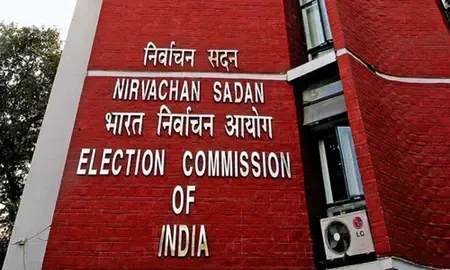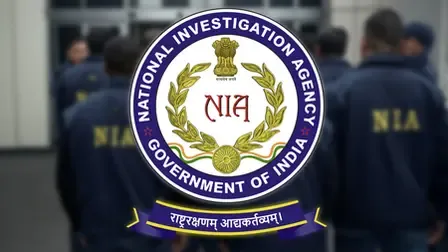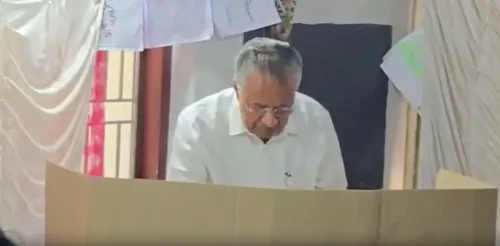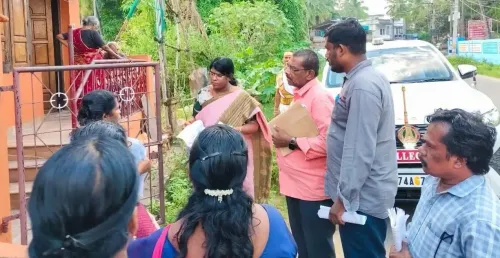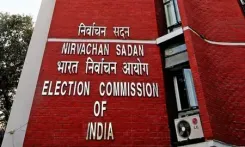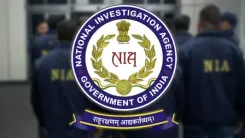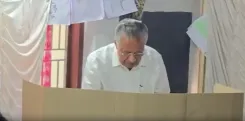Farmers Boost Security at Khanauri Border Following Recent Supreme Court Directives
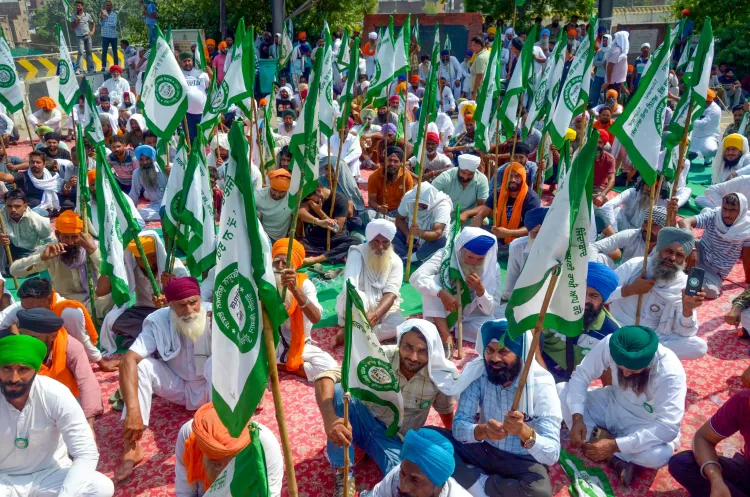
Chandigarh, Dec 29 (NationPress) Farm activists stationed at the Khanauri border have intensified security measures around the protest area, apprehensive that the Punjab government may once again try to forcibly transport the fasting veteran farmer leader Jagjit Singh Dallewal to a medical facility.
This action follows the Supreme Court's directive granting the Punjab government until December 31 to convince Dallewal, who has been on a hunger strike for over a month, to seek hospital care.
The 67-year-old leader has been fasting since November 26 to urge the Centre to acknowledge farmers' demands, which include a legal assurance for a minimum support price (MSP).
The apex court on Saturday criticized the state government for failing to act on its December 20 order and instructed the Centre to offer logistical assistance if needed.
The Punjab government recognized the court's concerns but asserted that it faced a challenging situation.
"The entire protest area is under siege by farmers who refuse to allow him to be moved. Any attempt to use force may result in collateral damage to both the farmers and police," argued Punjab Advocate General Gurminder Singh in court.
Farmers have established continuous vigils at the protest site, making it significantly challenging for the police to restrict access to Dallewal.
The Supreme Court on Saturday expressed frustration over the Punjab government's inability to hospitalize Dallewal, despite repeated medical recommendations, stating that this situation represents not only a "failure of law-and-order machinery" but also an "abetment to suicide."
As the state faced the court's criticism for the second consecutive day for not ensuring Dallewal's hospital admission, the top court condemned those obstructing his medical care, declaring that it would not yield to pressure or tolerate "a violent face" of the farmers' movement.
During a special session convened over the vacation, a bench comprising Justices Surya Kant and Sudhanshu Dhulia condemned the state's management of the situation, questioning the rationale behind allowing "a virtual fort to be established" around the protest area, suggesting that the state government seems to endorse the agitation that may lead to Dallewal's demise.
The case has been postponed to December 31, with the court warning of strict consequences for state chief secretary KAP Sinha and DGP Gaurav Yadav if its directives concerning Dallewal's hospital care are disregarded.
The Aam Aadmi Party (AAP) government, led by Bhagwant Mann, faced intense scrutiny from the Supreme Court for the second day in a row as the chief secretary and DGP cited "fear of resistance and violence" and potential "collateral damage" as reasons for their inability to transfer Dallewal to a hospital.
These two officials, who are under contempt proceedings for failing to comply with the court's December 20 order regarding Dallewal's hospitalization, attended the court proceedings virtually as directed.
Punjab's advocate general, Gurminder Singh, claimed that the state is "helpless" in adhering to the court's order for Dallewal's transfer to a hospital.
Singh informed the court that several medical boards have been monitoring Dallewal's health and that senior ministers and Punjab Assembly Speaker Kultar Singh Sandhwan have made attempts to persuade him to seek medical assistance.
However, Dallewal and various groups of farmers persist in resisting hospital admission, stressing their demands for MSP guarantees and other agricultural reforms.
Reading the affidavit submitted by the chief secretary and DGP, the Attorney General acknowledged that multiple groups of farmers had surrounded the protest area, hindering authorities from relocating Dallewal to a medical facility.
"Who has permitted this situation to continue? Who has allowed a virtual fort to be erected around him? Is this not a failure of law-and-order machinery?" the bench inquired pointedly.
"This is not a matter of demands or protests. Preventing someone who is critically unwell from receiving medical treatment is intolerable and unprecedented. This constitutes a criminal offense and amounts to abetment to suicide," it added.
The bench further noted that the Punjab government's actions implied tacit support for the protestors obstructing Dallewal's hospitalization.
"Your affidavit gives the impression that the state is backing him in continuing his fast at the site. Let us be absolutely clear -- the farmers' agitation is a separate issue, and we have consistently stated through our orders that their demands will be addressed. However, allowing a man's life to be endangered in this manner is a failure of constitutional duty," the bench remarked.
The court expressed disappointment that the state was struggling to find a balance between maintaining law and order and safeguarding human life. Addressing the AG and top officials present, the bench stated: "Your officers have witnessed Punjab's history of confronting significant challenges. Punjab has a commendable history of navigating tough situations in the past."
As Singh suggested that farmers might consent to Dallewal's hospitalization if some "conciliation" was offered, the court replied: "It's becoming evident that the government is echoing their sentiments, but we are a constitutional court and will not yield. If anyone attempts to pressure us or impose conditions, we will not comply... And you need not act as their spokesperson. We have already extended our platform to them."
The bench granted the Punjab government additional time to comply with its December 20 order and instructed the Centre to provide logistical assistance if requested.
"We stand with the people of Punjab and the farmer community. Our orders are not adversarial but aimed at preserving the life of one of the state’s most prominent farmer leaders," the court stated.
The matter has been postponed to December 31, with the court warning of strict action against the state chief secretary and DGP if its directives concerning Dallewal's hospitalization are disregarded.
The court also scrutinized the motives of those impeding Dallewal's hospital admission, labeling their actions as harmful to the farming community.
"There seems to be peer pressure. What kind of farmer leaders wish for Dallewal's demise? We refrain from commenting on the bona fides of such leaders who desire his death in this manner. He appears to be under pressure or is aligned with such leaders. If Dallewal is experiencing peer pressure, what does that indicate about the integrity of these so-called leaders?" the bench queried.
Stressing the urgency of the situation, the court noted, "Dallewal can continue his fast in a hospital where his vital signs can be monitored. He does not need to end his fast, but he cannot be permitted to jeopardize his life in this fashion."
It instructed the senior officials to convey to the individuals at the protest site that those obstructing Dallewal's hospital transfer seek to deprive the farming community of one of its most significant leaders.
During previous hearings on December 18 and 20, the court cautioned that "the entire state machinery will be held accountable" if any harm were to befall Dallewal.
Dallewal's hunger strike, initiated on November 26, is part of a broader movement advocating for systemic agricultural reforms and legal assurances for MSP. Protests organized under the banners of the Samyukta Kisan Morcha (Non-Political) and Kisan Mazdoor Morcha have caused notable disruptions in Punjab and Haryana.
Despite mediation efforts by a Supreme Court-appointed committee, the deadlock has persisted.
The committee's report has underscored critical agricultural challenges, such as unsustainable farming practices and rising farmer debts, urging immediate government intervention.


